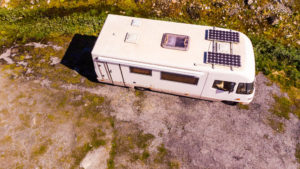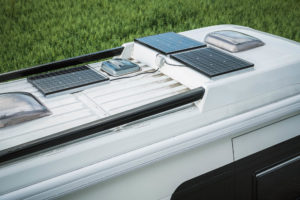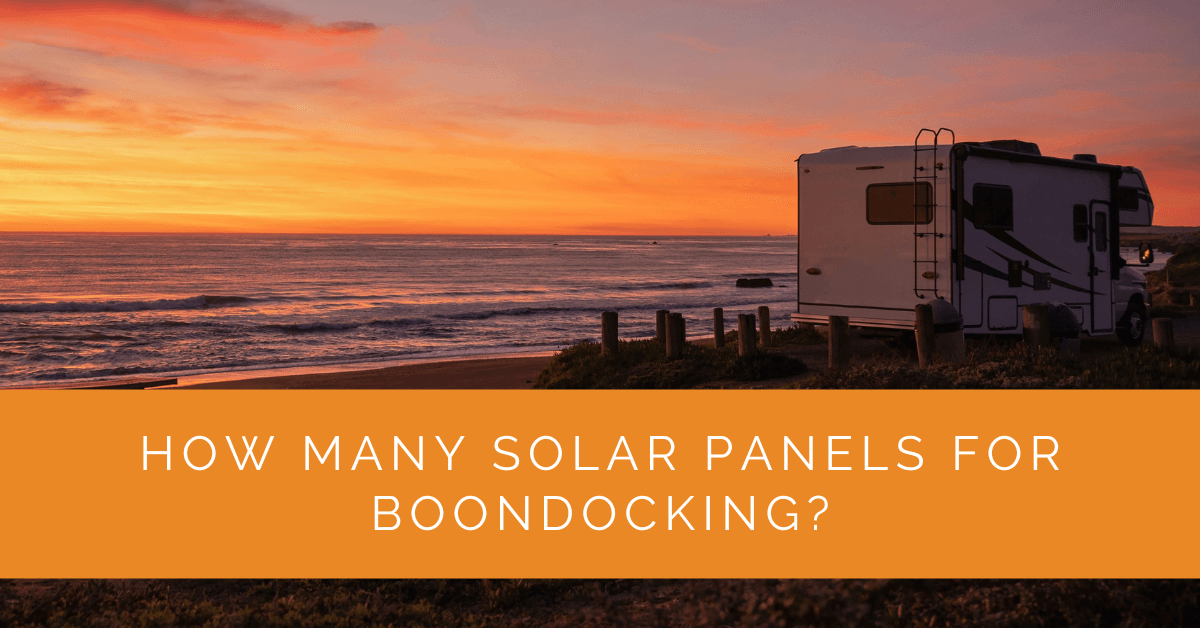Boondocking, a popular way of RV travel, allows adventurers to disconnect from traditional campsites and enjoy the freedom of off-grid living. Solar panels are a reliable and eco-friendly solution to power your RV during boondocking. But how many solar panels do you need for an efficient boondocking experience? This article will delve into the details of RV solar power systems, wattage calculations, and other considerations to help you determine the optimal number of solar panels for your boondocking adventures.
Contents
- 1 Key Takeaways
- 2 Understanding Boondocking and RV Solar Power
- 3 Calculating Your Power Needs
- 4 Determining the Number of Solar Panels Needed
- 5 Considerations for RV Solar Panels
- 6 Tips for Successful Boondocking with Solar Power
- 7 Case Study: Optimizing Solar Panels for Boondocking Adventures
- 8 Expert Insights From Our Solar Panel Installers About How Many Solar Panels for Boondocking
- 9 Experience Solar Excellence with Us!
- 10 Conclusion
- 11 FAQ
Key Takeaways
- Understanding your RV’s power needs and calculating your daily energy consumption is crucial for determining the solar panels required for boondocking.
- Factors like solar panel ratings, sunlight exposure, and the efficiency of your electrical system and charge controller play a significant role in optimizing the performance of your RV solar system.
- Implementing energy-saving practices, considering lithium batteries, and proper maintenance is key to maximizing the efficiency and longevity of your RV solar power setup.
Understanding Boondocking and RV Solar Power
What is Boondocking?
Boondocking, or dry camping, refers to camping in remote or undeveloped areas without access to traditional campground amenities such as electrical hookups. Boondocking enthusiasts rely on self-sufficiency and alternative power sources, making solar power an ideal solution.
The Importance of Solar Power for RVs
RVs are equipped with various appliances and systems that require electricity to function. Traditional power sources like generators and shore power connections may not be readily available during boondocking. Solar power systems offer an independent and renewable power source, allowing you to enjoy a comfortable and sustainable lifestyle on the road.
Benefits of Going Solar for Boondocking
- Energy Independence: With solar panels, you can produce clean energy, reducing reliance on fossil fuels and noisy generators.
- Silent Power Generation: Solar panels operate silently, preserving the peace and tranquility of your boondocking experience.
- Cost Savings: By harnessing the sun’s energy, you can significantly reduce or eliminate the need to purchase fuel for generators or pay for campground electrical hookups.
- Environmental Friendliness: Solar power is a renewable energy source that reduces your carbon footprint and helps preserve nature.

Calculating Your Power Needs
Assessing Your Electrical System
Evaluate your RV’s electrical system before determining the number of solar panels required. Consider the appliances and devices you plan to power, their wattage, and the average daily usage. This assessment will help you estimate your power consumption needs.
Understanding Your Solar Power Requirements
To determine the required solar panel capacity, you need to understand the wattage requirements of your appliances and the average daily energy consumption. By examining the wattage of each appliance and calculating the total watt-hours consumed per day, you can estimate the necessary solar power capacity.
Factors Affecting Solar Panel Efficiency
Several factors can influence the efficiency of your solar panels:
- Sunlight Exposure: Solar panels perform best when exposed to direct sunlight, so consider the geographical location and weather conditions of your boondocking destinations.
- Tilt and Orientation: Properly angling and orienting your solar panels towards the sun optimize energy production.
- Shading: Avoid shading on your solar panels, which can significantly impact their performance.
- Solar Charge Controller Efficiency: An efficient solar charge controller helps maximize energy capture and storage in your RV’s battery bank.
Determining the Number of Solar Panels Needed
Understanding Solar Panel Ratings
Solar panels are rated in watts, indicating their power output under ideal conditions. Common ratings include 100 watts, 200 watts, and so on. Understanding these ratings is essential for calculating the number of panels required.
Calculating Power Consumption
- Determine Daily Energy Consumption: Calculate the total watt-hours consumed by your appliances and devices daily.
- Account for Inverter Efficiency: If using an inverter to power AC appliances, factor in its efficiency as it affects the power conversion from DC to AC.
- Consider Battery Capacity: Determine your battery bank’s capacity to ensure sufficient storage for energy generated by solar panels.
Sizing Your Solar System for Boondocking
Once you have your daily energy consumption figure, consider the average solar panel output per day, considering sunlight exposure. Divide your daily energy consumption by the average daily solar panel output to estimate the number of panels needed. Remember to include a buffer for cloudy days or suboptimal conditions.

Considerations for RV Solar Panels
Types of Solar Panels for RVs
RV solar panels come in various types, including monocrystalline, polycrystalline, and thin film. Each type has advantages and considerations, such as efficiency, cost, and durability.
Advantages of Lithium Batteries for Solar Systems
Consider using lithium batteries instead of traditional lead-acid batteries when building an efficient RV solar system. Lithium batteries offer advantages such as higher energy density, longer lifespan, and lighter weight, making them ideal for RV applications.
Optimizing Your RV Solar System Efficiency
To maximize the efficiency of your RV solar system:
- Proper Panel Placement: Install your solar panels in a location that ensures optimal sunlight exposure and minimizes shading.
- Efficient Charge Controllers: Use high-quality solar charge controllers to regulate the charging process, preventing overcharging and optimizing battery health.
- Smart Energy Management: Implement energy-saving practices, such as using energy-efficient appliances, LED lighting, and smart power management systems.
Tips for Successful Boondocking with Solar Power
Conserving Power and Maximizing Efficiency
- Energy-Efficient Appliances: Choose energy-efficient appliances and devices to minimize power consumption.
- Power Management Practices: Adopt smart power management practices, such as turning off unused appliances, optimizing thermostat settings, and utilizing natural lighting.
Managing Energy Usage On the Road
- Monitoring Energy Levels: Keep track of your battery bank’s state of charge to avoid over-discharging or depleting power reserves.
- Using Energy Monitoring Systems: Implement energy monitoring systems that provide real-time data on energy consumption, allowing you to make informed decisions.
Maintaining Your RV Solar System
- Regular Inspections: Periodically inspect your solar panels, wiring, charge controllers, and batteries for any signs of damage or malfunctions.
- Cleaning Solar Panels: Clean your solar panels from dust, dirt, and debris to ensure optimal performance.
Case Study: Optimizing Solar Panels for Boondocking Adventures
Background
At Solar Panels Network USA, we are dedicated to providing innovative and reliable solar solutions for RV enthusiasts who enjoy boondocking. This case study highlights our approach to determining the optimal number of solar panels needed for an efficient boondocking experience.
Project Overview
Our client, an avid RV traveler, sought a sustainable solution to power their RV during off-grid adventures. The goal was to design a solar power system that would meet their daily energy needs while ensuring energy independence and reducing reliance on traditional power sources.
Implementation
Assessing Energy Requirements
We began by conducting a detailed assessment of the client’s energy needs. This involved listing all appliances and devices in the RV, their wattage, and average daily usage. Calculating the total watt-hours consumed per day was essential for understanding the client’s energy consumption patterns.
Calculating Average Daily Energy Consumption
Using the collected data, we calculated the average daily energy consumption in kilowatt-hours (kWh). This figure provided a baseline for determining the necessary solar power capacity.
Understanding Solar Power Requirements
Next, we analyzed the client’s boondocking destinations to estimate sunlight exposure and weather conditions. This information was crucial for calculating the average daily output of the solar panels and ensuring they could meet the client’s energy needs under various conditions.
Selecting the Right Solar Panels
We recommended high-efficiency monocrystalline solar panels due to their superior performance and durability. These panels were rated at 200 watts each, providing ample power generation capacity for the client’s needs.
Utilizing Solar Charge Controllers
To maximize energy capture and storage, we installed high-quality MPPT (Maximum Power Point Tracking) solar charge controllers. These controllers optimize the charging process, ensuring efficient energy transfer to the RV’s battery bank.
Designing the Battery Bank
We designed a battery bank using lithium-ion batteries, chosen for their higher energy density, longer lifespan, and lighter weight compared to traditional lead-acid batteries. This setup provided reliable energy storage and ensured the client could maintain power during periods of low sunlight.
Calculating the Number of Solar Panels
To determine the number of panels needed, we divided the client’s daily energy consumption by the average daily solar panel output, factoring in a buffer for cloudy days. This calculation ensured the system could consistently meet the client’s power needs.
Results
The optimized solar power system delivered impressive results:
- Energy Independence: The client achieved complete energy independence during boondocking, eliminating the need for generators or campground electrical hookups.
- Efficient Energy Use: The high-efficiency solar panels and advanced charge controllers ensured optimal energy production and storage, maximizing the system’s efficiency.
- Cost Savings: The investment in a quality solar power system resulted in long-term cost savings by reducing the need for fuel and electrical hookups.
- Environmental Impact: By relying on solar power, the client significantly reduced their carbon footprint, promoting environmental sustainability.
Summary
At Solar Panels Network USA, we pride ourselves on delivering tailored solar solutions that meet the unique needs of RV enthusiasts. By thoroughly assessing energy requirements, selecting the right components, and optimizing system design, we ensure our clients enjoy the benefits of energy independence and sustainable living. Our commitment to quality and innovation drives us to provide solar solutions that enhance the boondocking experience, allowing adventurers to enjoy the freedom of off-grid living without compromising on comfort or sustainability.
Expert Insights From Our Solar Panel Installers About How Many Solar Panels for Boondocking
Boondocking requires careful planning of your RV’s power needs. By calculating your daily energy consumption and considering factors like sunlight exposure and panel efficiency, you can determine the ideal number of solar panels for your setup.
Senior Solar Engineer
Properly placing and angling your solar panels is critical for maximizing energy production during boondocking. Ensuring optimal sunlight exposure and minimizing shading can significantly enhance your solar system’s performance.
RV Solar Specialist
Lithium batteries are a game-changer for RV solar systems. Their higher energy density and longer lifespan make them an excellent choice for reliable energy storage, especially for those who frequently boondock.
Lead Solar Technician
Experience Solar Excellence with Us!
Trust in Solar Panels Network USA, where our seasoned experts deliver top-quality solar solutions for homes and businesses nationwide. With a legacy of countless successful installations and a commitment to sustainable energy, we’re your reliable partner in the solar journey. Ready for a brighter, eco-friendly future? Call us now at (855) 427-0058 and harness the power of the sun!
Conclusion
Embracing solar power for boondocking offers RV enthusiasts a sustainable and reliable energy solution. By assessing your power needs, understanding solar panel ratings, and considering other factors, you can determine the ideal number of solar panels required for your boondocking adventures. Enjoy the freedom of off-grid living while reducing your environmental impact through the sun’s power!
FAQ
How much solar do you need for Boondocking?
The amount of solar power you need for boondocking depends on your RV’s power requirements. To determine the required solar capacity, assess your appliances’ wattage and calculate your average daily energy consumption. Factors like sunlight exposure and battery capacity should also be considered.
Can you Boondock with solar panels?
Absolutely! Solar panels are an excellent solution for boondocking. They provide a sustainable and independent power source, allowing you to enjoy off-grid living without relying on traditional campground amenities or noisy generators. Properly sized and optimized RV solar systems can meet your power needs while enjoying the freedom of boondocking.
About the Author
Solar Panels Network USA stands at the forefront of solar energy solutions, driven by a team of seasoned solar engineers and energy consultants. With over decades of experience in delivering high-quality solar installations and maintenance, we are committed to promoting sustainable energy through customer-centric, tailored solutions. Our articles reflect this commitment, crafted collaboratively by experts to provide accurate, up-to-date insights into solar technology, ensuring our readers are well-informed and empowered in their solar energy decisions.

